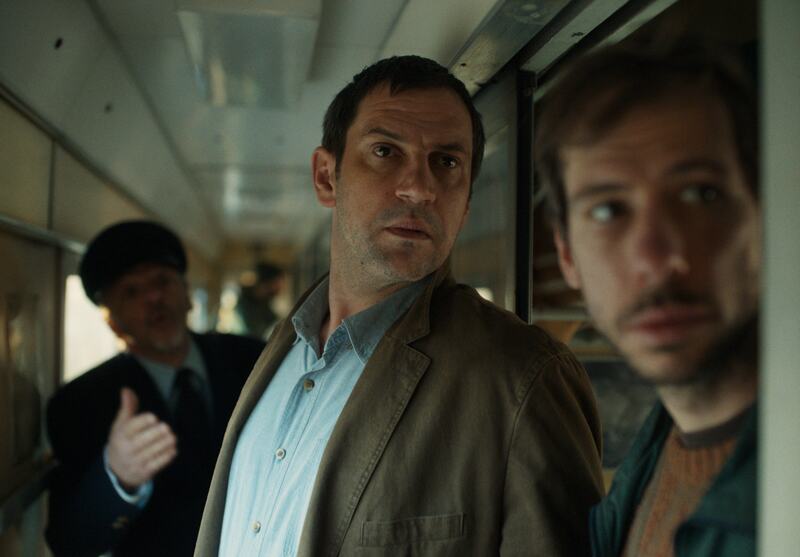
A Film That Dares to Question Right and Wrong
MOVIE REVIEW
The Man Who Could Not Remain Silent (Čovjek koji nije mogao šutjeti)
–
Genre: Drama, Short
Year Released: 2024
Runtime: 14m
Director(s): Nebojša Slijepčević
Writer(s): Nebojša Slijepčević
Cast: Goran Bogdan, Alexis Manenti, Dragan Mićanović, Silvio Mumelaš
Language: Croatian and Serbian with English subtitles
Where To Watch: showing at the 2024 Cannes Film Festival
RAVING REVIEW: Navigating through the treacherous waters of the Bosnian War, THE MAN WHO COULD NOT REMAIN SILENT offers more than just a retelling of past horrors. Directed by Nebojša Slijepčević, this film delves into the depths of moral fortitude and the stark choices individuals face amidst chaos.
THE MAN WHO COULD NOT REMAIN SILENT recounts a dark chapter in history and an immersive examination of the human spirit’s response to dire circumstances. Slijepčević transports viewers to a day marked by violence when peace was shattered along the tracks from the Serbian capital of Belgrade to the town of Bar, a major seaport in Montenegro. As Serbian paramilitary forces disrupt the journey, they execute a merciless act, forcibly removing and killing 19 Muslim passengers—events witnessed by 500 other passengers, each trapped by their silence.
At the narrative's core, Tomo Buzov (Dragan Micanovic,) a retired military officer, becomes the emblem of defiance. His solitary act of bravery against the tormentors contrasts with the paralysis of fear that grips his fellow travelers. Slijepčević captures this moment, transforming it into a critical cinematic pivot that challenges viewers to reflect on their possible reactions in similarly extreme situations. Buzov’s courageous stance is not merely a plot point but a profound commentary on the ethics of intervention and human behavior in crises.
Slijepčević, whose notable works include documentaries like SRBENKA and GANGSTER OF LOVE, infuses the film with a personal flair that elevates it from historical documentation to a platform for universal moral inquiry. His direction guides the film through a narrative that prompts viewers to ponder enduring questions of right, wrong, and ethical responsibility.
The director's stylistic choice to wrap the narrative in a palpable silence not only amplifies the tension but also enhances the emotional gravitas of the film, making the terror and isolation experienced by the passengers resonate deeply with contemporary audiences. This silent backdrop is a powerful metaphor for the broader implications of bystander inaction and the isolating nature of fear.
Moreover, the film explores individuals' diverse roles in times of upheaval—aggressors, victims, and witnesses. Each role is explored with depth and nuance, offering viewers a panoramic view of human responses to violence. This multifaceted portrayal provides insights into the complex dynamics of human behavior under stress and highlights the varied moral landscapes navigated by individuals during conflicts. All in just a 14-minute runtime, the film manages to capture this microcosm of a much larger event.
While the narrative captures the essence of the incident, I wouldn’t mind seeing the film expanded into a feature; broadening the scope to include the personal histories of other passengers could add deeper resonance to the film’s portrayal of collective and individual trauma. The psychological depth Slijepčević brings to portraying the bystanders’ experiences powerfully engages the audience, encouraging deep reflection on their actions or potential inactions in crises.
THE MAN WHO COULD NOT REMAIN SILENT is a significant film achievement that documents a heartbreaking episode of the Bosnian War and compellingly explores the human capacity for indifference and heroism. Through Slijepčević’s direction, the film transcends its historical context to issue a resonant call to moral action, urging its audience to consider their position in the continuum of history and humanity’s ongoing struggle between passivity and proactive courage.
For more reviews, please visit https://linktr.ee/overlyhonestr
You can follow me on Letterboxd, Instagram, Twitter, and YouTube. You can also find my social media accounts on most platforms by searching Overly Honest Movie Reviews.
I’m always happy to hear from my readers; please say hi or send me any questions about movies.
[photo courtesy of ANTITALENT PRODUKCIJA, CONTRAST FILMS, LES FILMS NORFOLK, STUDIO VIRC, MANIFEST]
DISCLAIMER:
At Overly Honest Movie Reviews, we value honesty and transparency. Occasionally, we receive free items for review, including DVDs, Blu-rays, CDs, Vinyl, Books, etc. We assure you that these arrangements do not influence our reviews, as we are committed to providing unbiased and sincere evaluations. We aim to help you make informed entertainment choices, regardless of our relationship with distributors or producers.
Amazon Affiliate Links:
Additionally, this site contains Amazon affiliate links. If you purchase through these links, we may receive a commission. This affiliate arrangement does not affect our commitment to honest reviews and helps support our site. We appreciate your trust and support in navigating these links.



Average Rating